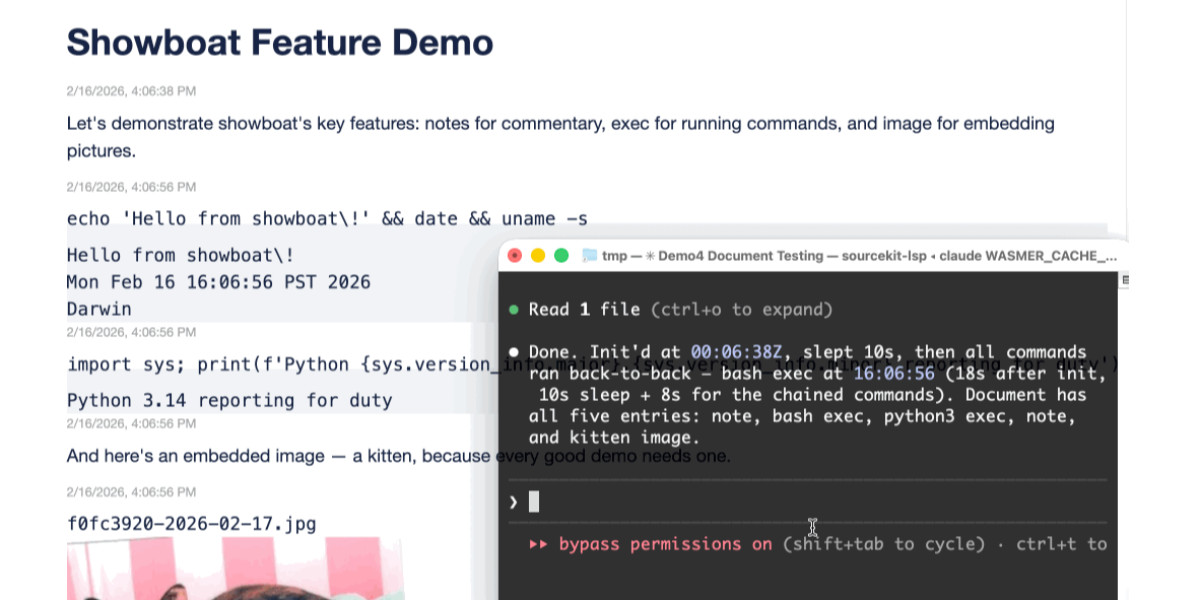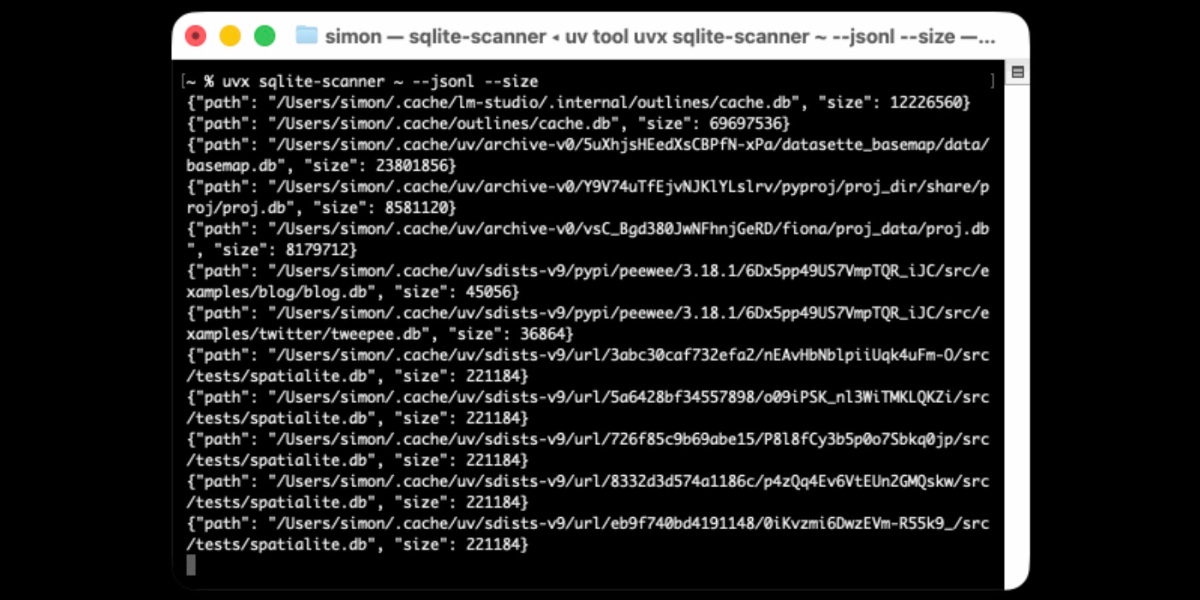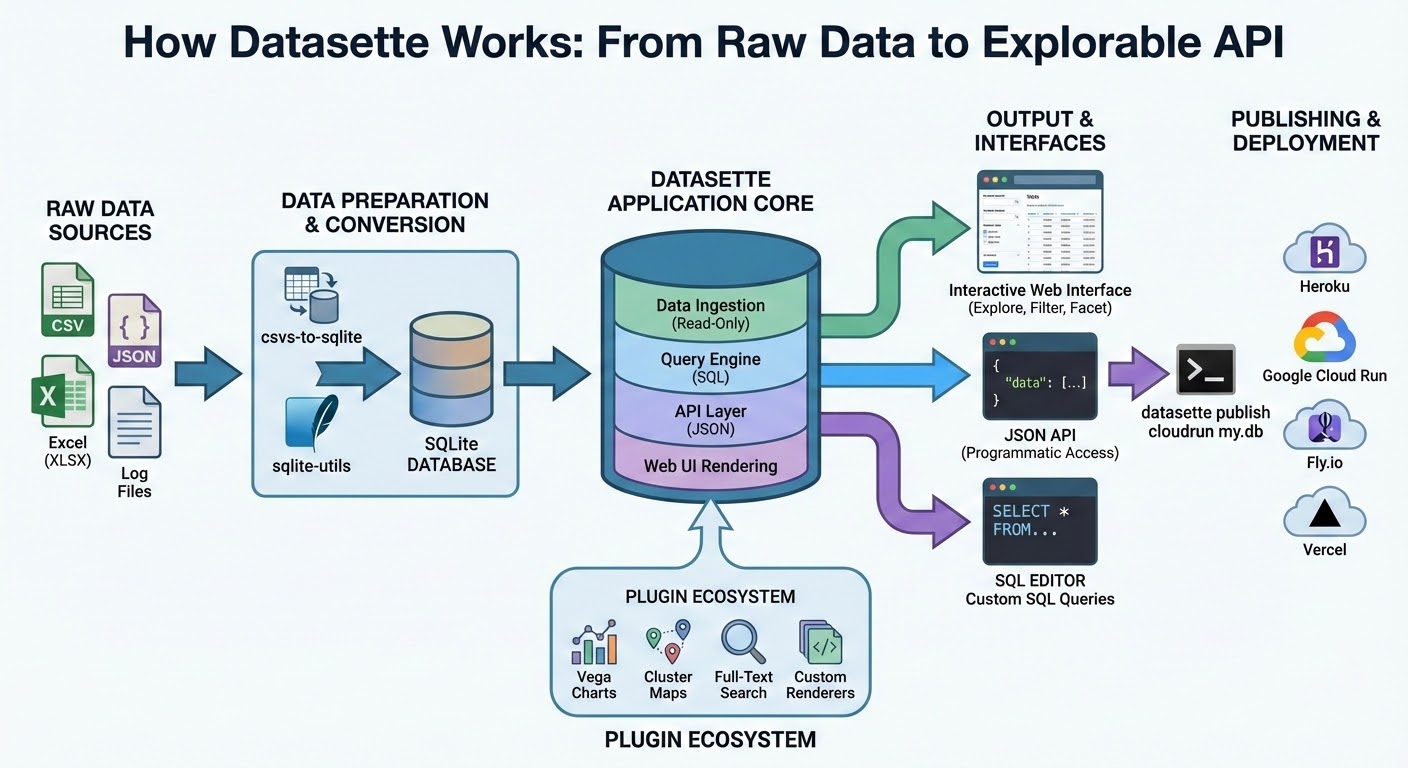1,455 posts tagged “datasette”
Datasette is an open source tool for exploring and publishing data.
2026
Two new Showboat tools: Chartroom and datasette-showboat
I introduced Showboat a week ago—my CLI tool that helps coding agents create Markdown documents that demonstrate the code that they have created. I’ve been finding new ways to use it on a daily basis, and I’ve just released two new tools to help get the best out of the Showboat pattern. Chartroom is a CLI charting tool that works well with Showboat, and datasette-showboat lets Showboat’s new remote publishing feature incrementally push documents to a Datasette instance.
[... 1,756 words]Distributing Go binaries like sqlite-scanner through PyPI using go-to-wheel
I’ve been exploring Go for building small, fast and self-contained binary applications recently. I’m enjoying how there’s generally one obvious way to do things and the resulting code is boring and readable—and something that LLMs are very competent at writing. The one catch is distribution, but it turns out publishing Go binaries to PyPI means any Go binary can be just a uvx package-name call away.
Introducing the Codex app. OpenAI just released a new macOS app for their Codex coding agent. I've had a few days of preview access - it's a solid app that provides a nice UI over the capabilities of the Codex CLI agent and adds some interesting new features, most notably first-class support for Skills, and Automations for running scheduled tasks.
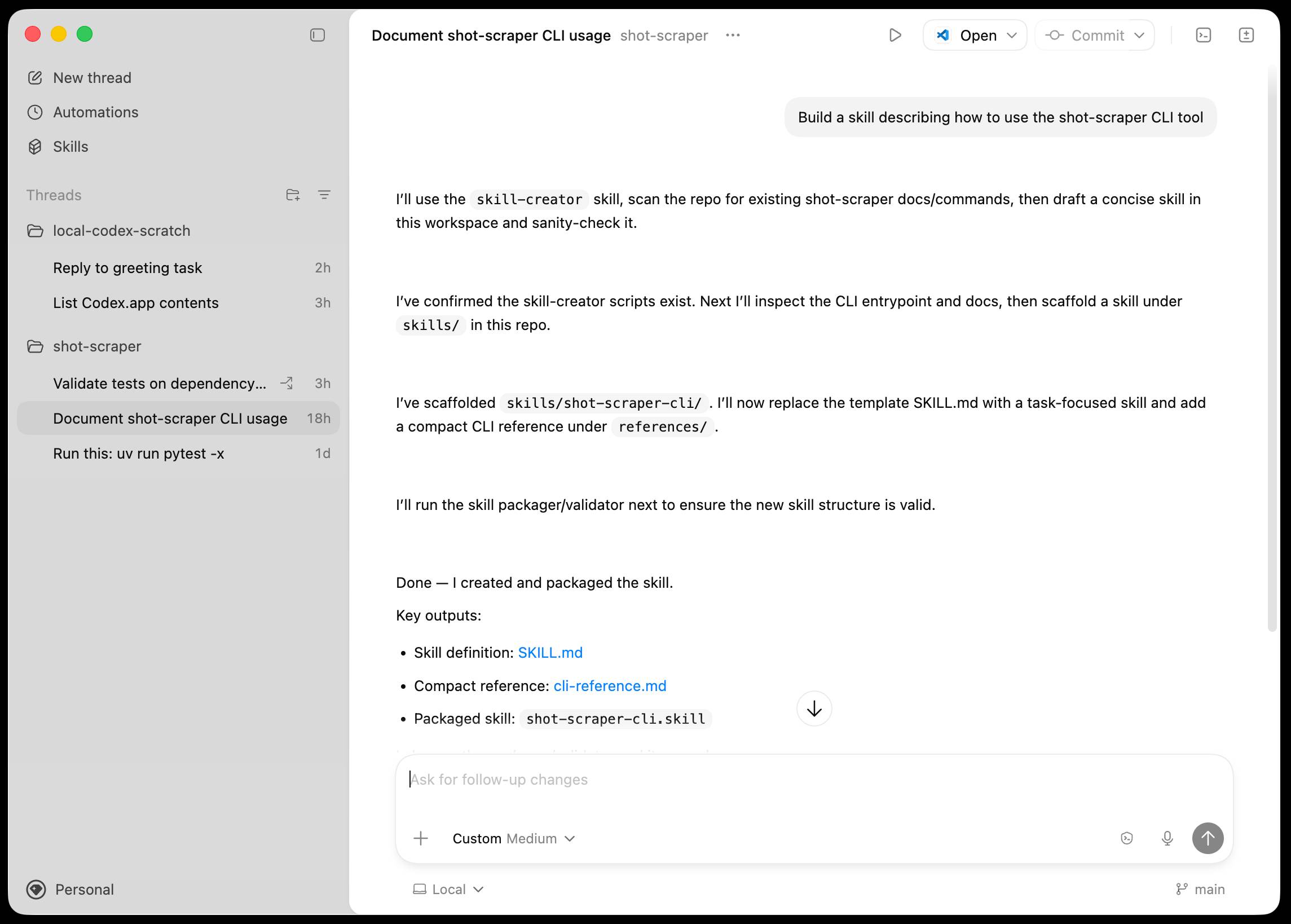
The app is built with Electron and Node.js. Automations track their state in a SQLite database - here's what that looks like if you explore it with uvx datasette ~/.codex/sqlite/codex-dev.db:
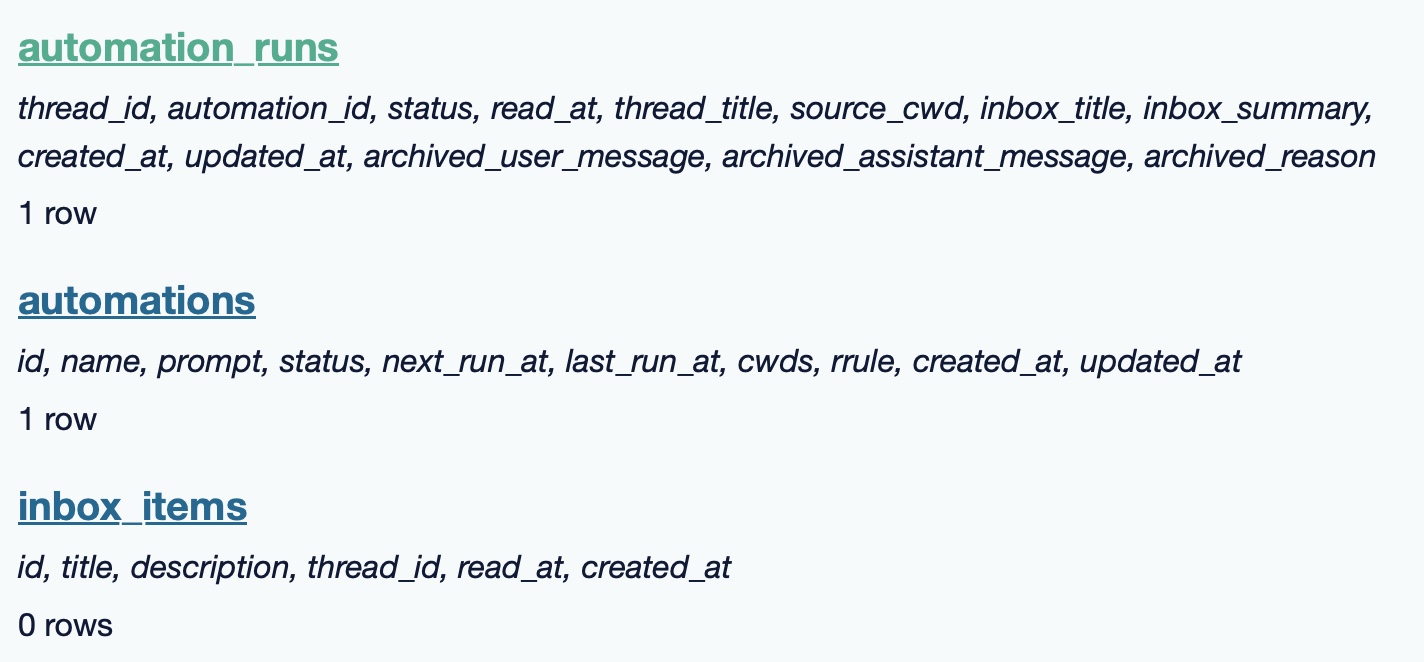
Here’s an interactive copy of that database in Datasette Lite.
The announcement gives us a hint at some usage numbers for Codex overall - the holiday spike is notable:
Since the launch of GPT‑5.2-Codex in mid-December, overall Codex usage has doubled, and in the past month, more than a million developers have used Codex.
Automations are currently restricted in that they can only run when your laptop is powered on. OpenAI promise that cloud-based automations are coming soon, which will resolve this limitation.
They chose Electron so they could target other operating systems in the future, with Windows “coming very soon”. OpenAI’s Alexander Embiricos noted on the Hacker News thread that:
it's taking us some time to get really solid sandboxing working on Windows, where there are fewer OS-level primitives for it.
Like Claude Code, Codex is really a general agent harness disguised as a tool for programmers. OpenAI acknowledge that here:
Codex is built on a simple premise: everything is controlled by code. The better an agent is at reasoning about and producing code, the more capable it becomes across all forms of technical and knowledge work. [...] We’ve focused on making Codex the best coding agent, which has also laid the foundation for it to become a strong agent for a broad range of knowledge work tasks that extend beyond writing code.
Claude Code had to rebrand to Cowork to better cover the general knowledge work case. OpenAI can probably get away with keeping the Codex name for both.
OpenAI have made Codex available to free and Go plans for "a limited time" (update: Sam Altman says two months) during which they are also doubling the rate limits for paying users.
Datasette 1.0a24. New Datasette alpha this morning. Key new features:
- Datasette's
Requestobject can now handlemultipart/form-datafile uploads via the new await request.form(files=True) method. I plan to use this for adatasette-filesplugin to support attaching files to rows of data. - The recommended development environment for hacking on Datasette itself now uses uv. Crucially, you can clone Datasette and run
uv run pytestto run the tests without needing to manually create a virtual environment or install dependencies first, thanks to the dev dependency group pattern. - A new
?_extra=render_cellparameter for both table and row JSON pages to return the results of executing the render_cell() plugin hook. This should unlock new JavaScript UI features in the future.
More details in the release notes. I also invested a bunch of work in eliminating flaky tests that were intermittently failing in CI - I think those are all handled now.
The most popular blogs of Hacker News in 2025 (via) Michael Lynch maintains HN Popularity Contest, a site that tracks personal blogs on Hacker News and scores them based on how well they perform on that platform.
The engine behind the project is the domain-meta.csv CSV on GiHub, a hand-curated list of known personal blogs with author and bio and tag metadata, which Michael uses to separate out personal blog posts from other types of content.
I came top of the rankings in 2023, 2024 and 2025 but I'm listed in third place for all time behind Paul Graham and Brian Krebs.
I dug around in the browser inspector and was delighted to find that the data powering the site is served with open CORS headers, which means you can easily explore it with external services like Datasette Lite.
Here's a convoluted window function query Claude Opus 4.5 wrote for me which, for a given domain, shows where that domain ranked for each year since it first appeared in the dataset:
with yearly_scores as ( select domain, strftime('%Y', date) as year, sum(score) as total_score, count(distinct date) as days_mentioned from "hn-data" group by domain, strftime('%Y', date) ), ranked as ( select domain, year, total_score, days_mentioned, rank() over (partition by year order by total_score desc) as rank from yearly_scores ) select r.year, r.total_score, r.rank, r.days_mentioned from ranked r where r.domain = :domain and r.year >= ( select min(strftime('%Y', date)) from "hn-data" where domain = :domain ) order by r.year desc
(I just noticed that the last and r.year >= ( clause isn't actually needed here.)
My simonwillison.net results show me ranked 3rd in 2022, 30th in 2021 and 85th back in 2007 - though I expect there are many personal blogs from that year which haven't yet been manually added to Michael's list.
Also useful is that every domain gets its own CORS-enabled CSV file with details of the actual Hacker News submitted from that domain, e.g. https://hn-popularity.cdn.refactoringenglish.com/domains/simonwillison.net.csv. Here's that one in Datasette Lite.
2025
Under the hood of Canada Spends with Brendan Samek
I talked to Brendan Samek about Canada Spends, a project from Build Canada that makes Canadian government financial data accessible and explorable using a combination of Datasette, a neat custom frontend, Ruby ingestion scripts, sqlite-utils and pieces of LLM-powered PDF extraction.
[... 561 words]Highlights from my appearance on the Data Renegades podcast with CL Kao and Dori Wilson
I talked with CL Kao and Dori Wilson for an episode of their new Data Renegades podcast titled Data Journalism Unleashed with Simon Willison.
[... 2,964 words]Nano Banana Pro aka gemini-3-pro-image-preview is the best available image generation model
Hot on the heels of Tuesday’s Gemini 3 Pro release, today it’s Nano Banana Pro, also known as Gemini 3 Pro Image. I’ve had a few days of preview access and this is an astonishingly capable image generation model.
[... 1,641 words]How I automate my Substack newsletter with content from my blog
I sent out my weekly-ish Substack newsletter this morning and took the opportunity to record a YouTube video demonstrating my process and describing the different components that make it work. There’s a lot of digital duct tape involved, taking the content from Django+Heroku+PostgreSQL to GitHub Actions to SQLite+Datasette+Fly.io to JavaScript+Observable and finally to Substack.
[... 1,345 words]